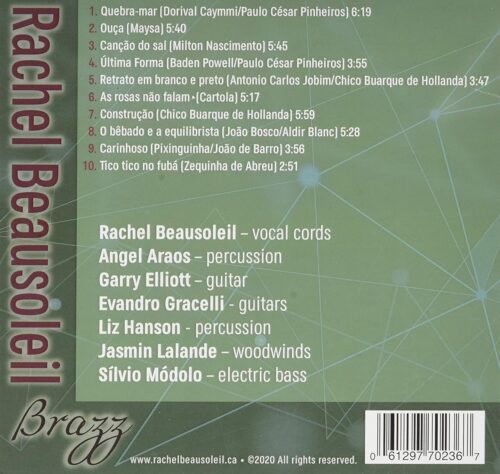BRAZZMATAZZ
This release may be subtitled Where Bossa Nova Meets Jazz, but I call Brazz “delectable.” The first stunner is that this Portuguese-sounding angel with perfect diction, as if singing from a beachside café in Rio de Janeiro, is actually Ottawa-based French-Canadian vocalist Rachel Beausoleil, who released this collection of Brazilian popular music last September. At the previous Monterey Jazz Festival, it was clear that the best jazz was Brazilian-flavored, and Beausoleil — with her third “worldly jazz” CD — proves why this is so. (She actually wrote a PhD thesis on Brazilian music!) And while Jobim makes an appearance as composer, you will be introduced to classics you probably haven’t heard before.
Immediately, the plaintive and bittersweet but seductive “Quebra-mar” by frequent collaborators Dori Caymmi & Paulo César Pinheiros pulls you in with Beausoleil’s unforced, slightly throaty vocals, which have the timbre of a woodwind. Adding to the transportive swaying is the soulful strumming from guitarist Garry Elliott and gentle, unobtrusive percussion of Liz Hanson. A come-hither romance runs through the light Bossa Nova of Maysa’s “Ouça”; the addition of Jasmin Lalande’s tenor sax gives this more of a club feel — perfect for a slow dance. Brazilian singer, songwriter, and guitarist Milton Nascimento’s “Canção do sal” keeps that deliciously undulating jazz feel alive, with string-player Evandro Gracelli offering creamy vocal backup. Slinky scooping and sliding meets playfulness in “Última Forma” written by the great guitarist Baden Powell, who teamed up with poet Pinheiros.
At the center of this 10-track winner is the heart of the album. Although Antonio Carlos Jobim originally wrote “Retrato em branco e preto” as the tale of a musician who has to pawn his violin to survive, Beausoleil — with only Mr. Elliott on his nylon-string guitar — culls the depths of Chico Buarque de Hollanda’s emotion lyrics, sounding as if she were an abused woman returning to the same bad man, whatever the cost. (Definitely check out Chet Baker’s version on his final album.)
Her vocals are so endearing, enchanting, and entrancing (she’s hypnotic on every track — even vocalizing with herself on Cartola’s “As rosas não falam“) that it’s easy to look past the sameness to the album’s slow, breezy selections. I would argue with Rolling Stone in naming Chico Buarque’s “Construção” as the greatest Brazilian song of all time, but it does indeed encompass the strength of so many Brazilian artists, who were polyglots and multi-instrumentalists who were often brilliant in both music and lyrics. Buarque is an important inclusion here because he — as with many of his contemporaries — continually brought other musical influences to Samba and Bossa Nova. (Beausoleil is a polyglot herself; she sings in six languages.)
The pace begins to perk up with João Bosco and Aldir Blanc’s “O bêbado e a equilibrista,” and Elliott and Hanson are so winning, playing with aplomb but not bringing attention to themselves. Really, just listen to the tap-tap-tapping of Hanson’s soft drum; it’s intoxicating. Next, the classic Brazilian choro “Carinhoso” — composed by Pixinguinha, lyrics by João de Barro — is so beautiful that it’s hard to imagine you’re hearing one of the first Brazilian genres of music. This 19th-century musical invention was mixed with sophisticated arrangements and Afro-Brazilian rhythms into what you here today. (It’s right now that I am regretting the lack of any liner notes from our Doctor with the Golden Tongue.)
And just when you’re prepared to lie in a hammock na praia (on the beach), out blasts one of the world’s favorite Brazilian tunes, “Tico tico no fubá” written by Zequinha de Abreu in 1917, and made famous by, among others, The Andrews Sisters and Mexican singer Carmen Miranda. This is my favorite track as it’s truly a showcase for Beausoleil’s gifts (and boy is it a tongue-twister that slides up and down the octaves). Clearly having a blast as well is her band, Sol da capital: Evandro Gracelli )cavaquinho, nylon-string guitar); Lalande; Sílvio Módolo (electric bass); and Angel Araos (percussion).
available at Amazon
for more info, visit Rachel Beausoleil


